
How To Stop Dachshund Behavior Problems
Many Dachshund owners would agree that doxies are the most loving family dog, but they can sometimes act out of spite and have choosy listening skills.
It can be very frustrating when experiencing Dachshund behavior problems. Luckily, by using some positive training techniques, many behavior challenges can be corrected…even in a Dachshund.
This page contains affiliate links and I earn a commission if you make a purchase through one of the links, at no cost to you. As an Amazon Associate, I earn from qualifying purchases.
Table Of Contents

Common Dachshund Behavior Problems
The most common Dachshund behavior problems include: Separation Anxiety, Excessive Barking, Eliminating Indoors, Digging, Destructive Chewing, and Aggression.
Let’s look at each of these issues and discover some helpful ways to resolve them.
Dachshund Separation Anxiety
We all want our dogs to feel calm and comfortable when we have to leave the house. So, it is important to understand what to do when Separation Anxiety strikes.
Separation Anxiety training is needed to help your dog learn that you will be back and they don’t need to panic when you are away.
Training Tip: If your dog has separation anxiety, most of the destruction will occur in the first 30 minutes of your departure.
Tips For Treating Separation Anxiety
Avoid Triggers
Certain noises, like getting your keys out or saying “Good-bye” can trigger a separation anxiety episode in your Dachshund.
Avoid direct interaction with your pup right before you leave.
Dogs reflect your behavior and will start to get upset if you indicate that you are leaving.
Walking
Taking your pup on a 20-minute walk each day before you leave and when you return will help calm their stress and anxiety.
Hired Help
Don’t let your Dachshund “hold it” for more than 4-5 hours at a time.
This can cause major panic and anxiety in your dachshund and it will cause them to have embarrassing accidents in your home.
If you work full time or are unable to let your doxie out during the day, hire some help or take your pup to a doggie daycare.
Search online for some local dog walkers in your area. I like to use Rover.com for dog walkers and boarding.
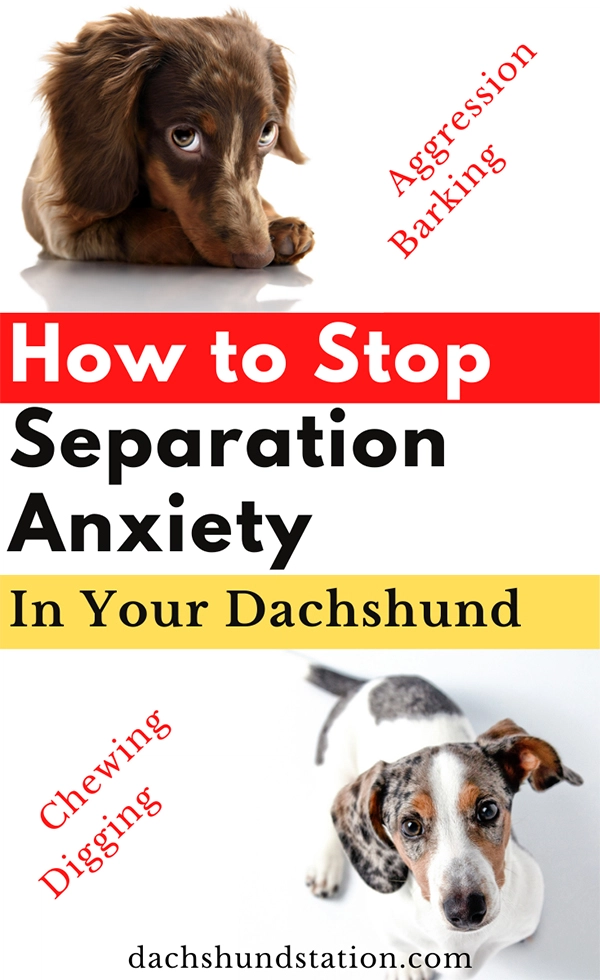
Catching Them In The Act
If you catch your Dachshund in the act of destroying something in the home through the window or remotely on a doggie camera, don’t go back inside your house!
This will reinforce the behavior. This will teach them to destroy something to get you to come back home…and you don’t want that.
Modern remote doggie camera systems (From Amazon) allow you to speak through a microphone so you can tell your dog to stop when they are up to no good.
Keeping Your Dog Occupied
Interactive dog toys and puzzles can help your dog stay mentally stimulated, so you don’t have to worry about them getting bored while you are away.
Dog IQ Puzzles: I found some great Doggie IQ Puzzles, Boredom Buster Activity Mats, and Interactive Tech Dog Toys worth checking out on my Dog Gift Post.
Treat Toys: Consider giving your dog a frozen peanut butter Kong toy treat before you leave. This is one of my favorite ways to keep my Dachshunds occupied for hours while I’m away.
Consult A Vet
For more severe cases of separation anxiety, consult your vet for some help. They may recommend some medications that can help keep your dog feel calm.
Natural Antidotes
You can use natural methods to calm dog separation anxiety too.
Calming Supplements
- Dog Calming Chews from Ready Pet Go help promote relaxation and helps reduce hyperactivity.

Sleeping Habits
Make sure your pup is getting enough sleep. Give them a comfortable dog bed and blanket to feel safe and warm at night or during nap time.
Excessive Barking
Why Do Dachshunds Bark So Much?
Dachshunds tend to bark excessively when they’re bored, excited, or simply craving some extra attention. But let’s be honest here, barking is one of the most well-known Dachshund personality traits. Along with their obsession with food, a doxie’s booming bark is practically built into the breed!
Dachshunds are naturally territorial and will bark to protect their pack (family members) and home. If your little long dog struggles with separation anxiety, this can also lead to excessive barking.
How To Stop Excessive Barking:
If your Dachshund’s needs are all met, but they still insist on barking at you…avoid responding verbally or physically.
Attention:
If you give them attention, they will continue barking to get more attention…creating a bad habit: Constant Dachshund Barking.
Give your dog positive attention and praise when they are showing good behavior (being quiet, not barking).
Exercise:
Dogs that constantly bark in the evening may be doing so out of boredom.
They need to have some playtime and more walks during the day to tire them out and help promote a good night’s sleep.
Distractions:
Dachshunds have “super senses” that help them do what they were born to do…Hunt, Track, and Guard! Their goal in life is to protect you and their home.
When your doxie barks at the door or window at something outside, tell them thank you (for keeping you safe), and lead them away from the area of distraction. This allows them to use their bark alarm a couple of times, but helps stop it from carrying on too long.
When they go potty outside, doxies are easily distracted by all of the sights, sounds, and smells of your yard. Try to find a quiet area of their yard so they can concentrate on the job at hand.
Post You May Like: Are Dachshunds Still Used For Hunting?
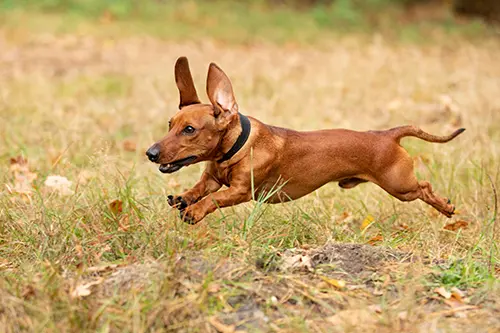
Eliminating Indoors
Dachshunds can be very temperamental. So, sometimes it can be hard to tell what the true cause of an indoor potty accident is.
Dachshund accidents in the house can be related to separation anxiety, undesirable weather outside, lack of training, Illness, or extra excitement.
It’s not always out of spite or payback.
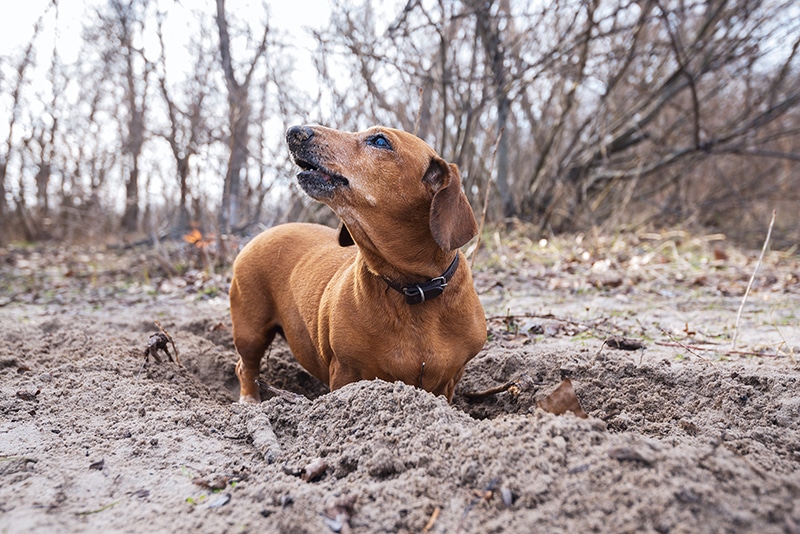
Digging
Why Do Dachshunds Dig? Dachshunds were bred to hunt badgers.
During the hunt, they had to do a lot of digging to help track down their prey.
Nowadays, doxies may dig out of boredom, hormones, temperature, or protecting their property.
Boredom:
Your dog may be bored and need something more constructive to do. Keep up their daily exercise, walking, or play routine to tire them out.
Hormones:
They may be hormonal or in-heat. Of course, the solution to this would be visiting your vet to get them spayed or neutered.
Temperature:
Your doxie might be too hot on a summer day and wants to dig and lay in the cool dirt. Be careful though, if that cool dirt is moist, it may contain nasty parasites or worms that can burrow into your dog’s skin, eww!!
Help your doxie find some cool shade or air conditioning so they are more comfortable.
Protecting Property:
A Dachshund may want to bury their favorite toy or bone.
My dachshunds love to dig and bury their toys in the couch cushions or cover their food bowls with a towel…it’s just something they do.
Chewing
As young puppies, Dachshunds use their mouths to explore their surroundings.
It is important to have lots of chew toys and bones available that your dog is allowed to chew, so he doesn’t go looking for your shoes or furniture.
Excessive Dachshund chewing can also be caused by Separation Anxiety.
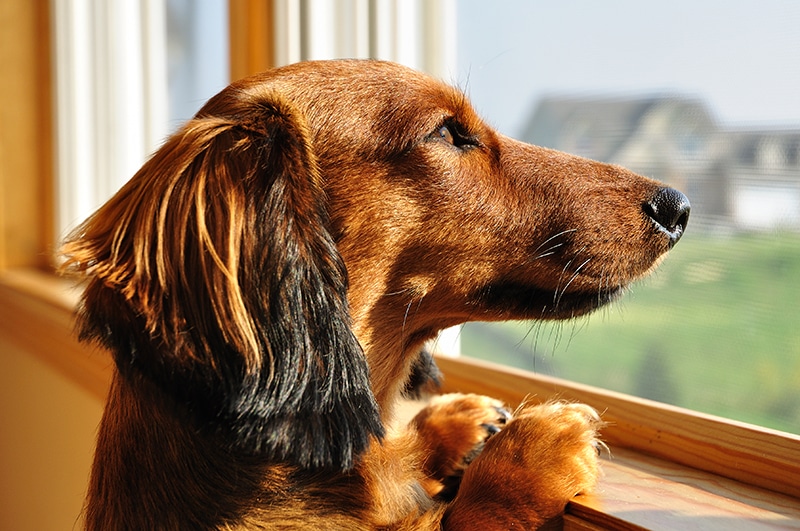
Aggression
Dachshund Aggression is the worst! So many doxie owners feel lost and upset when their loving Dachshund literally turns into a vicious brat. If your Dachshund shows their dominance towards people or dogs, they may have issues with submitting to authority.
Why Is My Dachshund Aggressive?
First, we need to look at some possible reasons for aggressive behavior in your Dachshund. Then, we will review some helpful tips to tame it.
What to Do About Dachshund Aggression
More Exercise:
Adding some more exercise to your Dachshund’s daily routine will help reduce stress and anxiety.
By walking, you are meeting your dog’s physical and mental needs. If your dog is cooped up all day, they may become more aggressive, bored, or depressed.
They need to get outside and move, just as much as you do.
One-on-One Training:
Your Dachshund loves spending time with you and earning yummy treats. So set aside some special training time each day for some one on one with your dog.

Professional Help:
If adding more exercise and revisiting command training still isn’t working for your dog, it’s time to seek professional help. Ask your vet to recommend a specialized dog behavior trainer in your area or you can do it right online. Dog training programs can be a great resource for addressing Dachshund separation anxiety and other behavioral issues.
To avoid any legal ramifications, get some help to cover yourself before your dog is the cause of any injury.
Cover Yourself: If your Dachshund is known for biting, consult your vet and keep them away from children. Post signs on your property to warn visitors about any potential dangers when they enter your home or yard.
Educate Yourself: Become more familiar with canine resource guarding and conditioning techniques. Here is a great post from Dr. Patricia McConnell called The Other End of the Leash.
Dachshund Possession Aggression
Friends, if you notice your Dachshund getting a bit possessive over their food or toys, check out my post called “The Dark Side of the Dachshund in Your Bed.”
In this article, I explain why it’s essential to address signs of possession aggression (aka resource guarding) early on. I share insights on how this behavior can escalate to other belongings, like your furniture and explain what steps to take to handle this type of behavior.

Bonus Tip
Many of the unwanted behaviors listed above are caused by doxie hormones and can be reduced or even eliminated by getting your Dachshund dog spayed or neutered. But, it is recommended to wait until a certain age to prevent serious health risks and developmental issues.
Read More: 5 Reasons Why You Should Wait To Fix Your Dachshund
When Do Dachshunds Calm Down?
In my experience, Dachshunds start to calm down around 1 year of age. As with most small breed puppies, that 1 year mark can be a game changer for many.
I get it! Dachshund puppies are so darn cute, but that first year takes a lot of patience to survive puppy training.
Dog Breed Comparison:
When I was first married, my husband and I had a mini dachshund, a dachshund-beagle mix, and a German Shepherd. We went a little overboard on the doggie family.
My mini dachshund had less puppy energy, less chewing and less potty training issues when he turned one.
My German Shepherd’s energy didn’t really calm down until he was 4 years of age. Everything else was tamed by 9 months.
My beagle-dachshund mix adapted to his brothers potty time routines and learned everything super quick by 9 months.
Disclaimer:
This post enables people to ask for and discuss dog health-related and behavioral advice, with the aim of connecting with other dog parents who may have faced similar situations. Our position is that the readers of this post fully understand that Dachshund Station does not endorse taking any advice given or received over that of a veterinarian or a certified dog trainer. Dachshund Station (Ava Jaine) is not responsible for the consequences of anyone choosing to implement any advice they receive.
The advice provided in this post is intended for informational purposes and does not constitute medical advice regarding dogs. For an accurate diagnosis of your dog’s condition, please make an appointment with your vet.
Are you struggling with Dachshund Behavior Problems? Please let us know in the comments below.
Helpful Links:
References:
- Schweitzer, Karen. 2010. Our Best Friends The Dachshund. Pittsburg, PA: Eldorado Ink.
- Pinney, Chris. 2010, 2000. Dachshunds. Hauppauge, NY: Barron’s Educational Series, Inc.


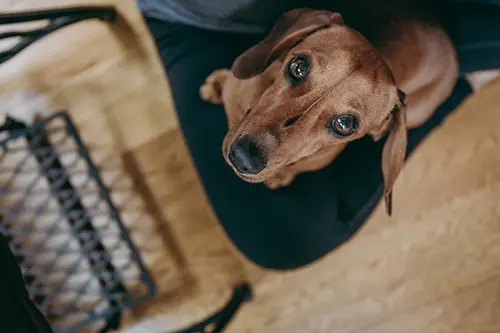


I have a dachshund who turns in circles, jumps on me and as he does he nips. This behavior occurs when I get up in the morning, or when I return from work, or get up from taking a nap. I know he is over excited but i need to cut the nipping in the bud. Any suggestions?
Hi Rebecca! It sounds like your dachshund is full of energy and excitement. I understand that the nipping can be a concern. Here are a few suggestions to help manage this behavior:
1. Consistent Training: Teach him the “sit” command and reward him when he obeys. Use this command when you come home or get up, and only give attention when he is calm and sitting.
2. Redirect the Behavior: Have a toy or chew object ready for him to grab when he starts getting excited. This can help redirect his need to nip.
3. Ignore the Behavior: If he starts nipping, immediately stop giving him attention and turn away. Wait until he calms down before interacting with him again.
4. Exercise and Mental Stimulation: Make sure he’s getting plenty of physical exercise and mental stimulation throughout the day.
5. Professional Help: If the behavior persists, consider seeking help from a professional dog trainer or behaviorist.
With patience and consistency, I’m sure your dachshund will learn to greet you in a gentler manner. I hope this helps!
We have a 4 yr old male neutered doxie we adopted from a couple that could no longer keep him. He’s very attached to my husband as the wife never bonded to with him . He’s been with us couple years and has been very good ..he does have resource guarding but has also progressed with that. The main issue now is that at night he gets very aggressive with me I can walk walk into living room at night and he acts like going to attack me.. he sleeps in his crate in our room at night with the door open but when I come to bed he goes crazy! He barks, snarls, lunges out… I even start talking to him as I walk into the room so not to spook him but he keeps doing it! He’ll finally stop after I get in bed! He’s never done this before and he’s fine during the daytime! HELP’
Hi there, thanks for writing in. This can be very scary. I have a doxie that resource guards and we don’t let him sleep in bed anymore to avoid a nighttime aggression incident. I have had doxie parents reach out to me that they have been attacked in the middle of the night for moving their dachshunds out of the way when they hog the bed, so it is a good plan that your pup doesn’t sleep in the same bed as you considering.
Here are some suggestions, I hope they help you.
> Create a Positive Association: Try to create positive experiences when you enter the room at night. You can offer him a treat or his favorite toy when you come to bed, so he starts associating your arrival with something pleasant.
> Re-establish Boundaries: Consider re-establishing his sleeping boundaries. You might try keeping the crate door closed initially when you come to bed and then gradually opening it once he’s calm. This might help him feel more secure and less likely to react aggressively.
We have a 12 year old dachshund, brown (red) short hair. He’s a sweet dog with little to no aggression, however he has made my life extremely difficult. I have had to get rid of every rug in my house as he was peeing regularly on all of them. Unfortunately since we got rid of the rugs, he started urinating on the hardwood floor, peeing on the couches and beds, in laundry baskets, on literally anything and everything. He also poops in the house in places like my kids bedroom and on 6 month olds play mat, or under beds; both hidden and wide-open areas. He does urinate and poop in his kennel as well, even though he is never in there for more than a couple of hours. He has terrible separation anxiety, and the entire time we are gone he barks. he has no health issues and is otherwise a healthy dog. This is not new behavior and has been his behavior since he was a puppy. I will note that this was my husbands dog before we met, and he was one year old when I met him. He was not potty trained whatsoever, and obviously that plays big part in it. I have tried to train him over the years, but I have been unsuccessful. We let him outside often, as we have a very large fenced in backyard, and most of the time he has continuous access to outside when we leave patio doors open. However, my husband does not take him on walks. He is not great on a leash, and will pull so hard that he chokes. Of course he also barks at everything passing by as well so it’s kind of a nightmare to walk him. He shakes with anxiety most of the day, follow me on my husband around constantly and paces around the house when my husband is not home. His separation anxiety to my husband is definitely the worst.
I will add that he also digs through every trash can in the house on a daily basis, jump on tables regularly and steals food, even while we’re eating, and bites food out of my kids hands when it’s within reach, sometimes drawing blood (although I don’t think he is intentionally trying to hurt them, he just wants the food).
Everyone is constantly on guard during meal time to protect their food and we’re at the point where everyone is doing pee checks on the our beds before we get in. I have three kids and it is extremely frustrating cleaning up poo and pee every day all over the house. What is most upsetting is that I can’t even have a place to put my baby down on the ground because he will eliminate on it and destroy it. And as I mentioned earlier, even the hardwoods are urine soaked and stained. The one little play mat that I have for my baby girl is being turned into his personal pee and poo pad, and I just don’t know what to do. I have even tried pulling it up and putting it on the couch when not in use, however he will just jump on the couch and pee on the couch and on the play mat.
I can only imagine that this behavior is going to get worse as he continue to age and we start seeing age related control issues on top of his behavioral issues.
My question is this. What are our options at this point with a 12-year-old dog? I believe he needs to be medicated however, my husband is against that. I believe it’s in his best interest and there’s no way he can be happy living with this much anxiety. please help!!!!!!
Hi Laura, oh dear… I’m so sorry to hear this. Many dachshunds that were rescued later in life are “re-potty trained” just like a new puppy would be. Taking steps back to start from the beginning of potty training and staying consistent will help your dachshund understand where they need to go potty. It can be done, and will take lots of patience.
When your doxie isn’t fully potty trained, they shouldn’t have free roam of the house. If he’s not been fully potty trained, then he doesn’t know where he’s supposed to go. My dachshunds had trouble with being in a crate or small kennel. Whenever we stepped out, messes and separation anxiety would occur as well… So, I switched them over to a puppy playpen. The open top and plenty of room to rest, eat, and play while learning to potty train helps them stay calmer, and helps control any messes. If the puppy playpen isn’t an option, pick a room with easily cleanable floors (kitchen floor, etc..) and gate it up. Not more access to the other rooms of the house until fully trained.
Here is my guided video series on how to do that: https://www.youtube.com/playlist?list=PLf6FAKWjm0YOiUVq1LLX3MWEVNpf7zA2q
Try using a dachshund harness instead of a collar. Many doxies do pull and choke on walks, so collars aren’t a good option for them. I also like to walk my dachshund before leaving for work in the morning, have a sitter let them out in the afternoon, and I take them for a longer walk in the evening (when it’s dark) – so it’s less barking at others. I use a camping light to keep our path lit, and we walk as a family to make sure we all get some fresh air and exercise.
Garbage cans all need to have a locked top or up stored up higher than the doxie can reach. This is something that all age dachshunds are into and keeping them out of reach helps.
As far as age-related potty issues, yes, they can start to happen within the next few years or maybe happening now. This of course won’t be easily controlled when they are that age. I kept my 17-year-old Dachshund mix, Bastian, in a safe gated area and only let him out to wander when he was being fully watched or went outside for potty time, and daily walks.
As far as anxiety, yes, I would ask your vet for some help with that. There are other natural remedies you can try as well online for dog anxiety.
Keep in mind, a dachshund that doesn’t regularly get exercise – physically and mentally, will act out because they are unhappy. Dachshunds need things to do and they need to move their body on a daily basis. Getting into things or causing messes are usually an indication that they need something more.